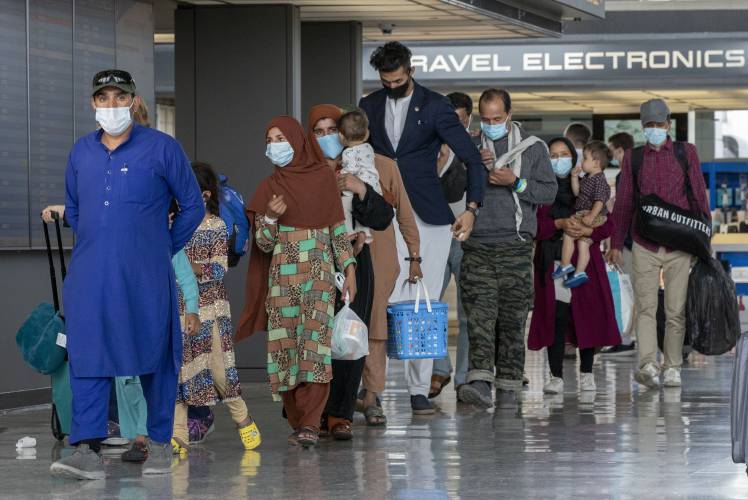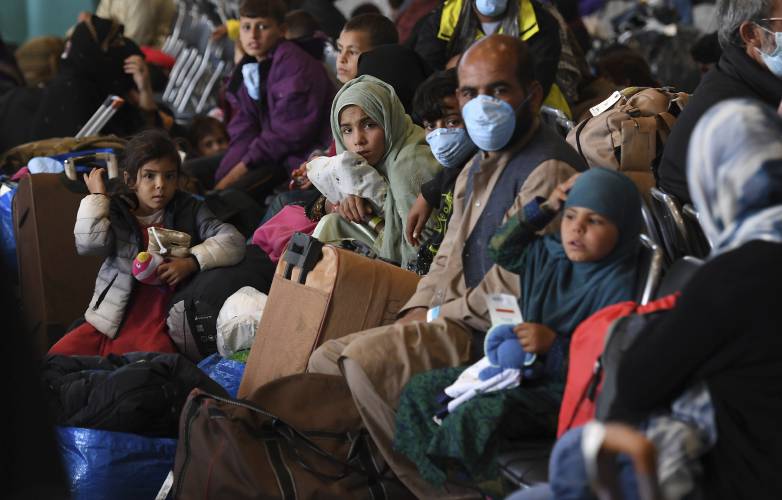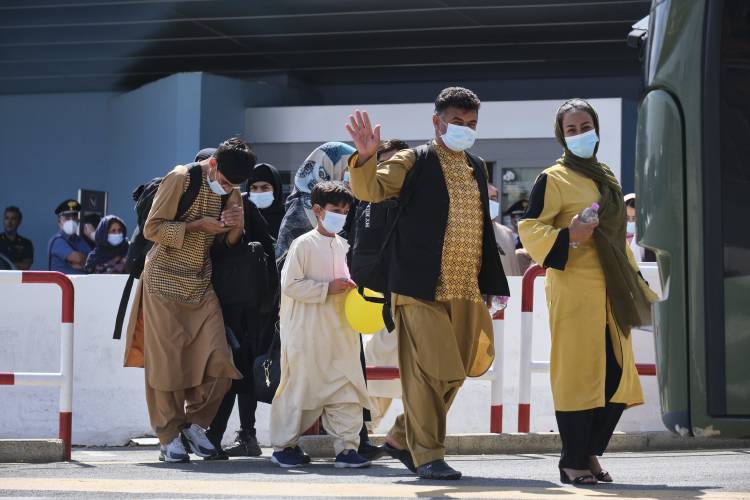
Story Produced by Concord Monitor, a Member of

When Mmunga Masimango arrived in Concord in 2016, it had been 17 years since he left his home in the eastern Congo. He spent most of his childhood and young adulthood in a refugee camp in Tanzania, living with his family in United Nations tents and waiting to find out if he would ever be able to return home.
Now a case manager at Overcomers Refugee Services and a senior at Southern New Hampshire University, Masimango knows well the lengthy journey that refugees embark on when they are forced to flee their home country and in settle in the United States.
That familiarity allows him to help Concord’s New Americans, a term that encompasses refugees as well as those who become permanent residents and citizens, as they search for jobs, learn English and adjust to life in a new culture.
Soon, he’ll be helping new Afghan arrivals fleeing the Taliban navigate some of the same challenges he faced.
The process that Masimango went through as a child to escape his war-torn home to a well-established professional in Concord required the cooperation of federal agencies, state government and local organizations. It can take years to bring refugees here, but it’s an effort that is being fast-tracked to assist those fleeing Afghanistan. The first newcomers were due to arrive in New Hampshire last week.

Becoming a refugee
Typically, a potential refugee begins the path to the U.S. by being granted the status of refugee by the United Nations High Commissioner for Refugees in their home country.
Next, an embassy or non-governmental organization can refer them to the United States, where they can apply at centers managed by the Department of State.
“No one chooses the country he wants to go to, or she wants to go to. It’s the country that picks people,” said Clement Kigugu, executive director at Overcomers and a former refugee.
A refugee, under the 1980 Immigration and Nationality Act, is someone who has experienced past persecution or has a credible fear of persecution in their home country because of race, religion, nationality, membership in a particular social group, or political opinion. This definition applies to people outside the United States, while asylum applies to those already inside the country.
“This is a person who has been persecuted and doesn’t have another solution, they can’t stay in their country of origin,” said Alexander Weber, chief institutional advancement officer at the International Institute of New England. “They have no home.”
The United States Citizenship and Immigration Services determines if someone fits the U.S. definition of a refugee and conducts security screening and interviews. Then, there are additional steps, including a screening for contagious diseases and obtaining a sponsorship assurance from a U.S. resettlement agency. No-interest loans funded by the Department of State pay for refugees’ flights.

Resettlement
In New Hampshire, staff from Ascentria or the International Institute of New England meet arriving refugees at the airport, move them into furnished housing, connect them to medical services, help them enroll children in schools, and make sure they can meet basic needs, like food and transportation.
The refugee resettlement process works as a public-private partnership between the federal government’s Office of Refugee Resettlement and nine national organizations, which in turn affiliate with local voluntary resettlement agencies.
Federal money goes to the local agencies to help refugees during the first 90 days, spelled out in a detailed contract. “It’s down to the number of forks we need to provide someone in their initial housing,” Weber said.
Refugees are referred to employment services and language classes, and they are eligible to apply for the same federal benefits as U.S. citizens, like Medicaid and food stamps. Due to a continuing resolution Congress approved in October, Afghans with humanitarian parole have access to the same services and benefits as refugees.
None of the dollars spent receiving refugees come from the state of New Hampshire.
Barbara Seebart is New Hampshire’s state refugee coordinator, responsible for acting as a liaison between the federal program and local agencies, and making sure refugees can access programs they need to succeed.
“We serve people up to five years after they arrive,” Seebart said. “The Congressional goal is to help refugees achieve self sufficiency, so all of our grants are supporting individuals and families to that end, to get them on their feet quickly and on viable jobs.”
The majority of refugees in New Hampshire are able to find jobs, according to data from the Department of Health and Human Services.
When Afghanistan evacuees begin arriving in New Hampshire this fall, they will go through a process of resettlement similar to refugees, although they will face extra hurdles when it comes to staying in the country permanently.
How Afghan evacuees differ
Afghans fleeing the Taliban takeover of their country this summer have been designated with a status called “humanitarian parole” by the Biden administration.
Humanitarian parole is a temporary status, often applied to people displaced by natural disasters, granted to people who don’t have a visa to enter the U.S. It was applied to thousands fleeing Vietnam after the withdrawal of American troops in 1975.
While Masimango and other refugees spent years in refugee camps in other countries before being able to resettle in the United States, Afghans arriving in New Hampshire are waiting inside the country, at one of eight military bases where they are being screened for health issues and vaccinated for COVID-19.
Resettlement agencies know less information about the Afghan people coming to Concord than they normally would, Weber said.
For other refugees, her agency might find out demographic information like religion or ethnicity, and even medical and work histories, before a family arrives. When staff picked up the Waziri family from Logan Airport on Oct. 13, Weber said they had only received the name of the “principal applicant” – just one of the two parents. The family is living in Massachusetts.
Many refugees are dealing with the trauma of losing loved ones or living through conflict, all while attempting to learn a new language, navigate a foreign culture and achieve basic stability in a job or at school. Some have seen members of their family killed. While they may feel safe in the United States, they miss the home and loved ones they left behind.
“All groups come under their own circumstances,” Seebart said. “What’s unique about the Afghans is what we saw on television; how traumatic it was, and how quickly they had to leave.”
Once they have arrived, refugees can stay in the United States lawfully and are allowed to adjust to permanent residency after one year and become citizens after five years, if they successfully pass the citizenship exam and pay fees.
Afghans with humanitarian parole status will have two years to petition for asylum. Asylum is not a sure path to staying in the U.S.; it can take years to be granted, and comes with legal costs, filing fees and the risk of denial.
“We’re just really unclear how many people will be left behind, how many parolees will be left behind, if we can’t find the resources and capacity to help them get asylum,” Weber said.

Making it in the U.S.
While Ascentria and the International Institute make sure refugees and Afghan evacuees have a place to live when they arrive, those families have to quickly begin supporting themselves.
Weber said her organization raises funds to ensure that refugees and the new Afghan evacuees won’t have to worry about rent for their first few months, but the high cost of living in Massachusetts and New Hampshire presents an ongoing problem.
“Refugees are resettled into poverty,” Weber said. “Organizations like us, we do our very best to set them up on a sound foundation.”
In Merrimack County, rents for two-bedroom apartments have increased 20% over the last five years, and the vacancy rate for rentals is 0.4%, far lower than the national average. “Housing is the thing that threatens resettlement to the greatest degree in New England. It’s not people’s will, it’s not their support, it’s really housing,” Weber said.
For Masimango, the chance to leave the poor conditions and nonexistent future in a refugee camp was life-changing.
But Kigugu said that it’s important to remember that refugees don’t come to the U.S. seeking better schools or jobs – they come because they have no other options. He worked overseeing a nonprofit organization in Rwanda before he came to the United States.
“I didn’t come here for opportunity,” said Kigugu. “It’s not really easy to leave…but when the war starts, you are forced to leave, no matter what.”
 These articles are being shared by partners in The Granite State News Collaborative as part of our race and equity project. For more information visit collaborativenh.org.
These articles are being shared by partners in The Granite State News Collaborative as part of our race and equity project. For more information visit collaborativenh.org.







